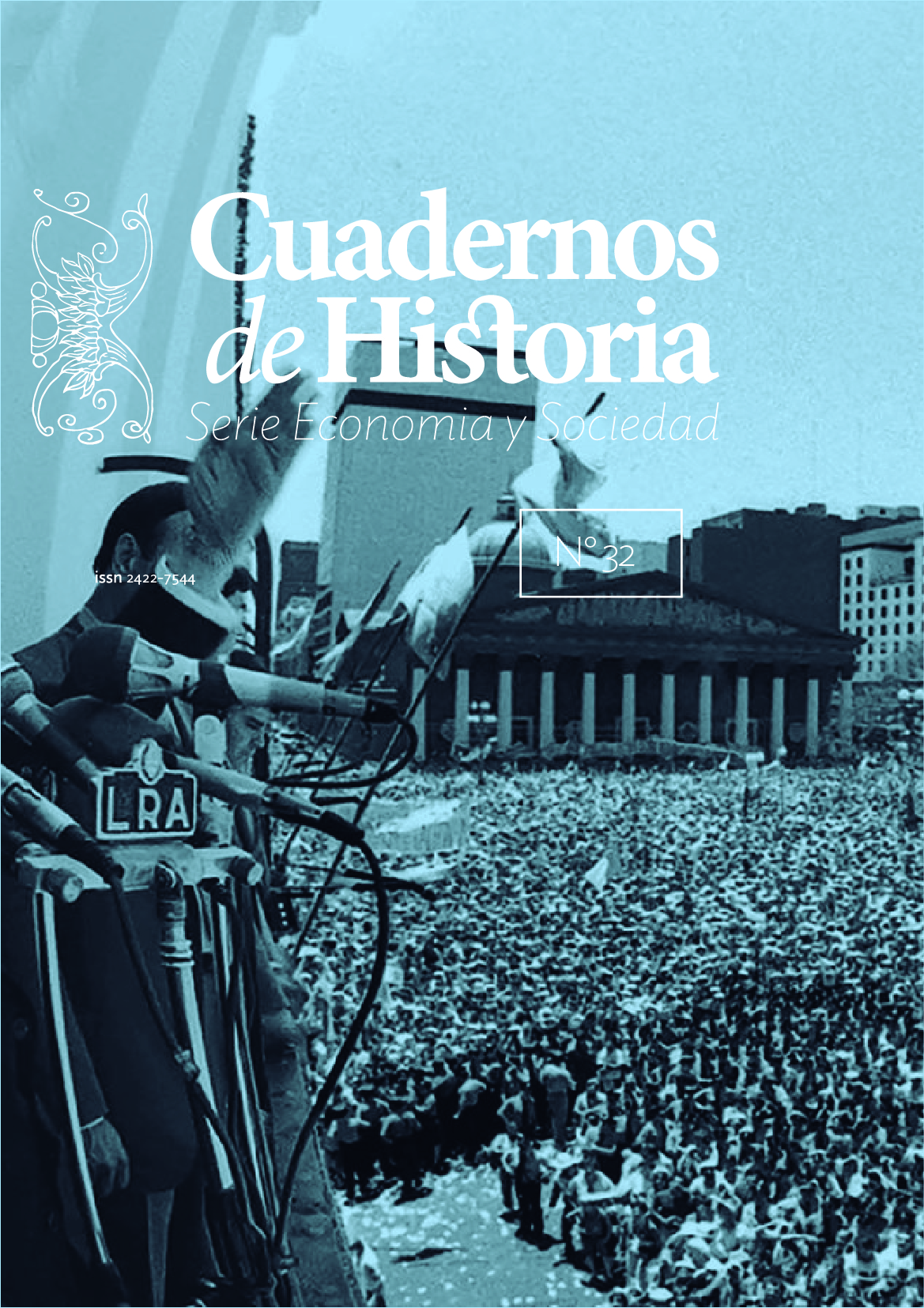The IMF's orthodox artillery against Bernardo Grinspun: a socio-metaphorical analysis
DOI:
https://doi.org/10.53872/2422.7544.n32.43462Keywords:
Economic policy, Socio-metaphorical analysis, Economic HistoryAbstract
In this essay we offer a critical approach to the use of orthodox discourse around the economic policy of Bernardo Grinspun in the Government of Raúl Alfonsín. For this, we apply the socio-metaphorical analysis proposed by Emmanuel Lizcano. We try to highlight, through an emblematic historical case, the way in which the theoretical construction of neoclassical orthodoxy allow to characterize a certain economic situation in apparently neutral, necessary, technocratic and scientific terms, hiding the plot of interests and underlying power in each instance. At the methodological level, this work draws on a historical-hermeneutic approach, based on secondary sources.
References
Aba, Anil, 2018, "Rhetoric and ideology in economics textbooks: an overview" en Marmara Journal of Economics Volume. Cilt, nº 2, pp. 1-14.
Adorno, Theodor, & Horkheimer, Max, 1969, La sociedad: lecciones de sociología, PROTEO, Buenos Aires.
Arakaki, Agustín, 2011, La pobreza en Argentina 1974-2006: construcción y análisis de la información, CEPED, Buenos Aires
Berger, Lawrence, 1989, "Economics and Hermeneutics" en Economics and Philosophy, nº5, pp. 209-233.
Brenta, Noemí, 2014, Historia de las relaciones entre Argentina y el FMI, Eudeba, Buenos Aires.
De Pablo, Juan Carlos, 2019, Política Económica para Decidir en Tiempos Difíciles, El Ateneo, Buenos Aires.
Dussel, Enrique, 2014, 16 Tesis de economía política. Interpretación filosófica, Siglo XXI Editores, México.
Eidlin, Fred, 2004, "Ideology, Objectivity, and Reality in Natural Science, Social Science, and Politics" en SSRN, pp. 1-15.
Ferreres, Orlando, 2010, Dos siglos de economía argentina (1810-2010): historia argentina en cifras, El Ateneo, Buenos Aires.
Garcete, Horacio & Goldwaser, Nathalie, 2018, Raúl Alfonsín por Raúl Alfonsín: discursos presidenciales ante la asamblea legislativa 1983-1989, Universidad de Buenos Aires, Buenos Aires.
Gilles, Donald, 2015, "Ideology and Science in Economic Theory" en University College London, pp. 1-16.
Graña, Juan, 2007, "Distribución funcional del ingreso en la argentina. 1935-2005", en Cuadernos del CEPED, pp. 1-97.
Heredia, Mariana, 2015, Cuando los economistas alcanzaron el poder (o como se gestó la confianza en los expertos), Siglo XXI editores, Buenos Aires.
Kinloch, Graham & Mohan, Raj, 2000, Ideology and the social sciences, Greenwoods, United States.
Kryeziu, Nexhat, & Hoxha, Egzon, 2021, "Fiscal Deficit and its Effects on Economic Growth: Empirical evidence Growth: Empirical evidence", en Finance & Banking Studies, vol. 10, nº 1, pp. 62-70.
Kusch, Martin, 2020, The Routledge Handbook of Philosophy of Relativism, Routledge Handbooks, New York.
Lavoie, Don, 1991, Economics and hermeneutics, Routledge, New York:
Lizcano Fernández, Emanuel, 2006, Metáforas que nos piensan. Sobre ciencia, democracia y otras po derosas ficciones, Bajo Cero / Traficantes de sueños, Madrid.
Lizcano Fernández, Emanuel, 2009, "La economía como ideología: un análisis socio-metafórico de los discursos de la crisis", en Revista de ciencias sociales, nº16, pp. 85-102.
Markus, Gyôrgy, 1981, "Concepts of ideology in Marx" en New School for Social Research, pp.87-106.
McCloskey, Deidre, 1998, The Rhetoric of Economics, The University of Wisconsin Press, Wisconsin-USA.
Muraca, Matías, 2004, "Discurso político hegemónico. El lenguaje politizado, el discurso de Bernardo Grisnpun del 19 de julio de 1984", VI Jornadas de Sociología. Facultad de Ciencias Sociales, Universidad de Buenos Aires, pp.1-19.
Neck, Reinhard, Richter, Christian & Mooslechner, Peter, 2008, Quantitative Economic Policy. Essays in Honour of Andrew Hughes Hallett, Springer, Berlin.
Nelson, Stephen, 2017, The currency of confidence: how economic beliefs shape the IMF’s relationship with its borrowers, Cornell University, United State.
Nyasha, Sheila & Odhiambo, Nicholas, 2019, "Government Size and Economic Growth: A Review of International Literature", en SAGE Open, pp. 1-12.
Ramírez, Hernán, 2010, "Precursores del "consenso": itinerarios de algunas ideas en Brasil y Argentina, 1961–1991", en América Latina en la Historia Económica, nº.34, pp. 271-296.
Rodríguez, Leandro, 2018, "Economía: ¿ciencia de la escasez o del excedente?", en Utopías, vol. 18, nº 24, pp.1-11.
Roig, Alexandre, 2016, La moneda imposible. La convertibilidad argentina de 1991, Fondo de Cultura Económica, Buenos Aires.
Schumpeter, Joseph, 1949, "Science and Ideology" en The American Economic Review, Vol. 39, nº 2, pp. 346-359.
Sierra Castro, Enrique, 1978, Introducción al análisis de la política económica: un planteamiento genérico e intuitivo, CEPAL, Santiago de Chile.
Steinmetz, George, 2005,The Politics of Method in the Human Sciences: Positivism and Its Epistemological Others, Duke University Press, United States.
Wiarda, Howard, 2010, Grand Theories and Ideologies in the Social Sciences, Palgrave Macmillan, United States.
Downloads
Published
Issue
Section
License
Copyright (c) 2023 Cuadernos de Historia. Serie Economía y Sociedad

This work is licensed under a Creative Commons Attribution 4.0 International License.
Authors publishing in this journal accept the following terms:
a. The author maintains their copyrights and grants this journal the publication of the first original version of their work that is subject to the Creative Commons Attribution License 4.0. This license agreement allows:
Sharing — copy and redistribution of the published material by any means and formats
Reusing — remix, change, and creation of new material from the published work for any purpose, including commercial use.
b. Authors may enter other non-exclusive license agreements of distribution of the version of the published work (i.e. uploading the material on an institutional virtual archive or republishing it on a monographic volume) as long as they attribute the publication of the original version to this journal.
c. It is allowed and recommended that authors publicize their work on the Internet (i.e. on institutional virtual archives or on their personal or professional websites) after their work has been published in this journal.




